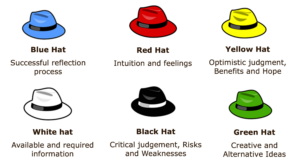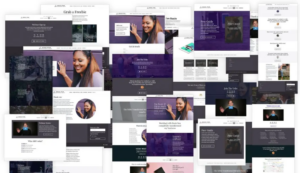Coaching news

The Power of the “Six Thinking Hats” in Coaching
The “Six Thinking Hats” technique, developed by psychologist Edward de Bono, is an innovative tool that enhances thinking, problem-solving, and decision-making processes. For coaches, it offers a structured way to guide individuals or teams through complex challenges by encouraging diverse perspectives. This method helps clients explore new ideas, gain clarity, and develop well-rounded solutions.

Professional tests : an added value for coaching
As coaches, we all know that our first tool is simply ourselves. Hence the importance of taking care of ourselves, our ‘alignment’ and our presence with others. Everything we need to actively listen to our clients and help them achieve their goals. However, we thought it would be interesting to return to the subject of the professional tests we use: personality, skills or values tests, etc. They can play a key role in our coaching practice, bringing significant benefits for both coachees and coaches. What are the main benefits of professional tests for our approach and our coaches ?

Sport can inspire business performance: A guide for coaches
As a business coach, your goal is to help leaders build high-performing teams. Achieving this requires more than just strategy—it demands continuous commitment, much like coaching a sports team. By drawing on lessons from the world of sport, you can inspire your clients to elevate their team’s energy, productivity and business performance.
Understanding Work Energy in Business
Successful teams, like winning sports teams, manage their energy well. As a coach, help your clients understand the three key types of energy that drive performance:
Physical Energy – The stamina and effort required to complete tasks.
Mental Energy – Focus, decision-making, and problem-solving abilities.
Emotional Energy – Motivation, commitment, and resilience.
Encourage leaders to assess their team’s current energy levels and identify any areas of imbalance. Are some employees overworked? Are others disengaged? By recognising these issues, you can guide them in redistributing energy for maximum efficiency.

Journaling for Coaches: A key to self-reflection and growth
As a coach, self-reflection is essential for personal and professional development. But how often do you make time to really reflect on your own practice? This is where journaling comes

Organisational Coaching: Empowering Growth and Transformation
Organisational coaching enhances workplace dynamics, driving employee growth, and fostering a culture of continuous improvement. It goes beyond the individual, aiming to align personal development with broader organisational goals. Leadership

Video Learning for Coaches
In the ever-evolving field of coaching, staying relevant and effective requires continuous learning. As a coach, you understand the importance of expanding your skills and knowledge to better serve your clients. While traditional methods like books and workshops remain valuable, incorporating video learning into your professional development offers unique advantages that can significantly enhance your coaching practice.
Video learning : Engaging and Interactive
Video content brings learning to life by combining visual and auditory elements, creating an engaging and immersive experience. As a coach, you can see techniques in action, hear expert explanations, and absorb information in a way that feels both dynamic and interactive. This multisensory approach often leads to a deeper and more intuitive understanding of concepts compared to text-based learning alone. By watching videos, you can observe the nuances of coaching strategies, body language, and client interactions, which are sometimes difficult to convey through written materials.

Begin Your Practice as a Coach
Are you aspiring to start coaching ? Starting your coaching journey, can be both an exciting and challenging experience. As you transition into this role, you’ll not only need to master coaching techniques but also understand how to apply theoretical knowledge to real-world situations. Here is an outline four essential aspects to consider as you embark on your path toward becoming a successful coach.
Please note that coaching is a much broader and richer practice than just a few points. Above all, it is a personal and professional journey where learning and questioning is constant.
Key Principles for Aspiring Coaches :
…

Integrating Intercultural Intelligence into Coaching Practice
I would like to share my reflections and cultural experiences that have transformed my coaching practice over the years. Working in an increasingly globalised world, I quickly realised that intercultural intelligence is not just a ‘nice to have’ but an absolutely essential skill. When you’re working with people from different cultures or in multicultural teams, cultural adaptation becomes a key success factor.
I’ve been working in the field of interculturality for 20 years, providing training and coaching in organisations and businesses to help managers and teams meet their intercultural challenges.
What is Intercultural Intelligence?
Intercultural intelligence is the ability to adapt and act effectively in the face of different cultural challenges and contexts. It means understanding, respecting, and navigating cultural differences. The good news is that intercultural intelligence is a skill that can be developed!
Why Integrate Intercultural Intelligence into Coaching practice?
To Build Trust
To Improve Communication
To Adopt a Broader Perspective
Supporting Clients in Their Intercultural Challenges
Strengthening Diversity in Organisations

6 Things That Make a Good Coaching Website
There are some obvious things that you should have on a Good Coaching Website.
THESE INCLUDE:
Easy ways for people to get in touch with you.
Clear calls to action so that people actually click around your website, find out more and join your email list or commit to working with you.
An email list builder such as a free resource so you can easily turn website visitors into leads and build a relationship with them so they can see you’re the coach to work with.
Brilliant, up to date photos of you so your website visitors start to feel a connection with you.
Evidence of how awesome you are such as testimonials, qualifications and logos of companies you have worked with or who recommend you.
AND THIS…
… Clear information about what you do and how you do it.
Now, the reason I have drawn this last one to your attention more than the rest is because some coaches and also quite a few people in the wellness industry often fall into the trap of writing a lot of words on their website without actually saying anything.
We see a lot of this kind of thing, “I’m here to empower and enable you to make a positive change in your life through creating a shift and making positive choices to overcome what has been holding you back. By doing this you yourself will have the power to make this shift and feel this change and the positive outcomes will enable you to take action in other areas of your life. If this sounds good then get in touch.”
While this all sounds incredibly positive and lovely I really have no idea what they’re asking me to get in touch about.

Unlocking Personal Excellence 🌹 A Journey into Jung’s Theory of Personality and Type
In Ralph Lewis’ enlightening book on various aspects of personality and Type, readers are invited on a transformative journey that goes beyond the conventional confines of Jungian theory. Rather than presenting a rigid framework, Ralph encourages his audience to develop a nuanced understanding of Jung’s theories, urging them to reflect on personal excellence, personal development and to consider relationships in a broader context, extending far beyond the boundaries of the workplace.
They therefore influence every decision a client makes. If decisions made are not in harmony with the individual’s values, it will create internal conflicts that are difficult to resolve. Consequently, when a person has a clear view of what their personal core values are, it’s easier for them to make a choice. Neglecting the role of values in coaching leads to a risk of dissatisfaction, demotivation and conflict of identity for the client.

How can we coach Personal Core Values?
The notion of personal core values play an important role in coaching. A value is a way of being or acting that is recognised as important by the individual. Jean Cottraux¹ defines them as stable beliefs which affirm that in life, certain goals are preferable to others. They serve as the essential and underlying rules on which a person establishes the main principles of their life. Values are at the core of a person’s system of beliefs.
They therefore influence every decision a client makes. If decisions made are not in harmony with the individual’s values, it will create internal conflicts that are difficult to resolve. Consequently, when a person has a clear view of what their personal core values are, it’s easier for them to make a choice. Neglecting the role of values in coaching leads to a risk of dissatisfaction, demotivation and conflict of identity for the client.

Group Dynamics or How to energise groups sessions
As you know, an “icebreaker” is an activity or game used to break the ice and create a relaxed, communicative environment within a group. In a coaching or group context, it paves the way for deeper discussions and is an excellent way to foster interaction, trust, and participation among group members. It helps participants get to know each other, feel more comfortable, and strengthen group cohesion, which is crucial for an effective group session.
We have all faced complex situations during our first remote sessions during the lockdown and continue to facilitate remotely today. We know that interactions play a vital role in group dynamics, allowing participants to share ideas, experiences, and perspectives, learn from each other, and work together to achieve common goals.
Here’s how interactions can be encouraged and effectively managed in the context of group coaching or a workshop, whether remote or in-person:

The Power of the Introverted Leader
Where is their strength and how can you as a coach help them make the most of it? What does it actually mean to be introverted? An introverted leader possesses

Monitoring and management of coaching sessions
Why monitor and manage your coaching sessions?
In the world of coaching, both business and personal, the effectiveness of each session is more than just good questioning between coach and coachee. Close monitoring of every interaction, progress and feedback is an essential basis for achieving tangible and measurable results.
Analysis of coaching-specific monitoring needs
Monitoring your coaching sessions means more than tracking progress. It requires a deep understanding of your coachee’s specific interactions, goals and challenges. Here, it is crucial to clearly identify the goals of the coaching. Is it aimed at professional or personal development, stress management, or emotional management? Each goal requires its own approach.

Overcoming perfectionism in the business world
Perfectionism in business can be a double-edged sword. While striving for excellence can lead to high-quality work, it can also create stress, delay progress, and stifle creativity. Coaching often involves helping individuals and teams find a balance between high standards and practical productivity.
Here’s a structured approach step by step to address perfectionism in your coaching practice:
STEP 1 : Understanding Perfectionism
STEP 2 : Recognising the Impact
STEP 3 : Setting Realistic Standards
STEP 4 : Embracing Imperfection
STEP 5 : Time Management and Prioritisation
STEP 6 : Continuous Improvement

Three tools to expand your coaching skills
A good coach possesses a combination of personal attributes, coaching skills and knowledge that combine to provide effective guidance and support to clients.
Personal traits:
Ability to empathise with the feelings and experiences of others. Patience to give clients time to grow and achieve their goals. Honesty and reliability to gain and maintain clients’ trust.
Professional skills:
Active and attentive listening. Asking the right questions for deeper insights and promoting self-reflection on the part of the coachee. A good coach can help clients identify problems and find effective solutions
Knowledge and expertise:
A good coach has a solid foundation in the theories and techniques of coaching. Experience helps a coach to recognise and deal effectively with a wide range of situations. A good coach is committed to continuous professional development through courses, workshops and literature.

Emotional Intelligence : a challenge for coaches
Coaches have heard for years about emotional intelligence (EI). As coaches we want to have an impact and connect more deeply with our clients and provide more impactful and meaningful coaching experiences.
Emotional intelligence is the basis of coaching for both parties. If both the coach and the client are fully aware and in control of their emotions, their communication is smooth and effective.
Being aware of our emotions is essential to bring the right coaching presence to the session and handle anything that can happen skillfully and effectively.
But what makes it challenging for coaches to apply Emotional Intelligence?

Identifying and overcoming the challenges presented by the Imposter Syndrome
The Imposter Syndrome, the persistent feeling of inadequacy despite evident success, is a common challenge among coachees as well as coaches. This psychological pattern leads individuals to doubt their abilities and fear being exposed as a “fraud,” even when they are highly competent and accomplished.
The Imposter syndrome often manifests through:
Perfectionism
Setting extremely high standards and feeling inadequate when these standards are not met.
Attribution of Success to External Factors
Believing success is due to luck or other external factors rather than one’s own abilities.
Fear of Failure
Avoiding challenges due to the fear of being exposed as incompetent.
Downplaying Accomplishments
Dismissing praise and undervaluing one’s achievements.
It’s interesting to observe how Coaches, whether in the context of executive, career, life, or performance coaching, play a pivotal role in addressing and balancing the effects of imposter syndrome.

Resilience and neuroscience…What do they have in common?
Resilience is one of the latest buzzwords. But what exactly are we talking about?
What is resilience?
Resilience is a psychological phenomenon in which an individual affected by trauma (difficult or stressful situations) acknowledges the traumatic event and adapts by overcoming the obstacles to recover better and bounce back. Hence, the individual can rebuild his or her life in a way that is socially acceptable to him or herself and to others.
Research also shows that resilience is linked to what neuroscientists call cerebral plasticity or neuroplasticity: the brain’s ability to reorganise and remodel itself in response to changes in the environment. This cerebral plasticity can itself be stimulated by regular training and the repetition of new behaviours. Neuroscience therefore helps us to better understand the underlying mechanisms of resilience by examining how the brain processes and regulates stress and emotion.

I am great !
A couple of years ago, I had a coaching session that ended up being deeply moving for us both. We were meeting for the second time. The coachee started out by chattering about a number of things that seemed unrelated to any goal, and I found myself getting impatient. After a few minutes, I interrupted and said something like :
« I am still not clear about what you would like to get out of this conversation. We don’t have many sessions together, and I want to make sure that we have a discussion today that you consider very, very important. How can we do that ?»

Structure your Coaching with the Vital Questions Framework
The Vital Questions Framework is a simple, clear but extremely powerful means of structuring coaching sessions. It consists of a two by two matrix which looks at the task and the people aspects of any situation and then further divides the areas into those that are external to the person and those that are internal.